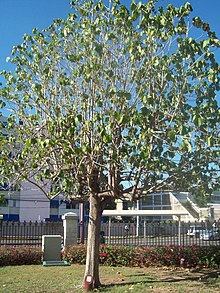Hibiscus elatus
| Blue mahoe Talipariti elatum |
|
|---|---|
 |
|
| Blue mahoes are common urban trees in Jamaica. This one is growing in Emancipation Park, Kingston. | |
| Scientific classification | |
| Kingdom: | Plantae |
| (unranked): | Angiosperms |
| (unranked): | Eudicots |
| (unranked): | Rosids |
| Order: | Malvales |
| Family: | Malvaceae |
| Subfamily: | Malvoideae |
| Tribe: | Hibisceae |
| Genus: | Talipariti |
| Species: | T. elatum |
| Binomial name | |
|
Talipariti elatum (Sw.) Fryxell |
|
| Synonyms | |
|
Hibiscus elatus Sw. |
|
Hibiscus elatus Sw.
The blue mahoe, Talipariti elatum, is a species of flowering tree in the mallow family, Malvaceae.
Talipariti elatum is native to the islands of Cuba, Jamaica the US. Virgin Islands and Puerto Rico. In wetter areas it will grow in a wide range of elevations, up to 1,200 metres (3,900 ft) and is often used in reforestation. It is the national tree of Jamaica.
The Talipariti elatum tree is quite attractive with its straight trunk, broad green leaves and hibiscus-like flowers. It grows quite rapidly, often attaining 20 metres (66 ft) or more in height. The attractive flower changes color as it matures, going from bright yellow to orange red and finally to crimson.
The name mahoe is derived from a Carib word. The ‘blue’ refers to blue-green streaks in the polished wood, giving it a distinctive appearance.
The blue mahoe is a beautiful and durable timber that is widely used for cabinet making and also for making decorative objects such as picture frames, bowls and wood carvings.
The inner bark of the tree is often referred to as Cuba bark because it was formerly used for tying bundles of Havana cigars.
...
Wikipedia
